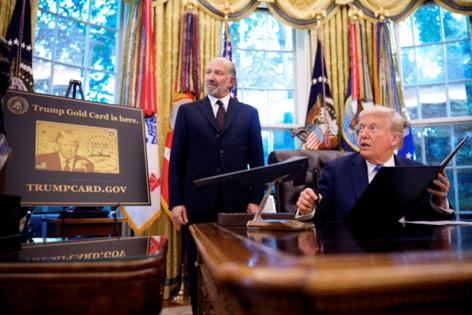Minnesota companies brace for hit from Trump's $100K work visa fees
Published in Business News
WASHINGTON — Hiring managers in key Minnesota job sectors, from health care to industrial research, say the state’s already tight labor pool could be further constrained by the new $100,000 fee on new visa applications for highly skilled workers.
President Donald Trump on Friday signed an executive order meant to reduce companies’ reliance on the H-1B visa program — the nation’s mechanism for hiring foreign workers for specialty jobs, like computer science engineers and doctors — by increasing a company’s sponsorship fee from a few thousand dollars to $100,000.
So far this year, the government approved more than 3,600 H-1B visa applications for high-skilled jobs critical to Minnesota businesses from the Mayo Clinic to UnitedHealth Group, the University of Minnesota and 3M.
The rule went into effect Sunday morning for all new applications but not existing visas up for renewal, administration officials said.
But the pipeline of highly educated foreign workers could be squeezed by the higher fee on new petitions that the White House says is needed to boost domestic hiring. Trump’s proclamation contends “systemic abuse of the program has undermined both our economic and national security.”
Critics characterize the move as draconian.
“This is monumental,” said Isaac Cheifetz, a Twin Cities-based employment consultant focused on the digital and information technology sector. “For Fortune 500 companies, every one of them uses H-1Bs."
Avoiding H-1Bs, Cheifetz said, is tantamount to avoiding products manufactured in China. In other words, nearly impossible.
The White House suggested such a clampdown of foreign hiring was needed to boost domestic hiring in high-tech fields, which have been harmed by layoffs.
The percentage of IT jobs held by visa-holders has jumped from 32% in 2003 to 65%, the White House said in a follow-up release. Meanwhile, unemployment for recent computer science graduates is double the rate for biology or art history majors.
“Stop the nonsense of letting people just come into this country on these visas that were given away for free,” Commerce Secretary Howard Lutnick said in the Oval Office.
But proponents of high-skilled visas through the H-1B program say hiring foreign workers with specialized skills keeps American companies competitive in global fields, particularly in technology, and represent just a fraction of the overall workforce.
In Minnesota, where about 3 million people are employed, the workforce has shrunk nearly 30,000 people since the beginning of the decade, according to state statistics.
Steven Thal, an immigration attorney based in Minnetonka, said the $100,000 fee has caused widespread panic among some employers.
Thal initially wondered, “Is this for real? Or is this some kind of spoofing?” He doesn’t foresee many employers with the wherewithal to pay the fee.
“To have a $100,000 fee added to the costs that are already associated with H-1B processing is, in effect, a bunker-buster bomb that’s going to blow up the whole system.”
Large Minnesota employers, including Medtronic, Target and Best Buy, and even smaller firms such as Red Wing Shoes, all had H-1B visa applications approved last year.
The state’s banking sector and logistics companies also rely on H-1B workers.
Of St. Paul-based Ecolab’s 19,000 U.S. employees, only 61 use the H-1B program.
Three years ago, the number of H-1B visa holders in Minnesota soared past 5,000.
Companies must seek U.S. governmental approval to hire a foreign national on a visa. Before Friday’s change, companies paid between $2,000 and $5,000 per petition, depending on their size.
Alex Danzberger, CEO of Brooklyn Park-based Aprios Custom Manufacturing, whose 85 workers make surgical equipment, medical device components and parts for water treatment facilities, said his company does not hire H-1B workers. But he has worked at companies where H-1B hiring was an option. He couldn’t imagine any firm moving forward with the new fee.
“I’d have to think twice about making that decision,” Danzberger said. “In good conscience, I couldn’t do that. I’d just have to, you know, take the time to find somebody who’s already here.”
The H-1B change impacts future applications but caused tumult for current H-1B visa holders and their employers, with some companies calling overseas employees to the U.S. immediately to avoid being barred entry.
“We were, of course, inundated from panicked emails from basically every one of our major corporate clients, from human resource departments around the country to individuals who are potentially impacted,” said Michael Davis, a Minneapolis attorney.
Davis said the administration’s surcharge on H-1Bs would basically end that visa program, unless a legal challenge prevails. He said he assumes litigation will come, given the fee seems “so out of line with anything that’s ever happened before.”
The Trump administration has sought to remake the U.S. labor force, prioritizing domestic workers and making it more difficult for foreigners to be employed in America across industries, ranging from agriculture to Silicon Valley.
On Friday, Trump also signed an executive order creating a so-called “Trump Gold Card,” to foreigners seeking legal U.S. residency. The fee? $1 million.
Switching off from foreign workers is not necessarily an immediate gain for America, said Cris Ross, a Minnesota-based former health care chief information officer.
“Everyone would like to hire someone local,” Ross said. “But the world is running on tech, and even though American universities are doing a really solid job, there’s more demand than there are (American) people with the skills necessary.”
_____
Includes reporting from Star Tribune staff writers Dee DePass, Patrick Kennedy and Victor Stefanescu.
_____
©2025 The Minnesota Star Tribune. Visit at startribune.com. Distributed by Tribune Content Agency, LLC.












Comments